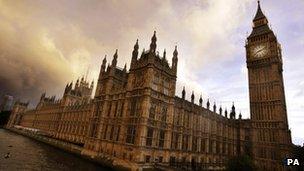Lobbying law 'would outlaw TUC conference'
- Published
- comments

David Cameron warned in 2009 that lobbying would be the "next big scandal"
Planned laws to stop lobbying scandals are "an outrageous attack on freedom of speech worthy of an authoritarian dictatorship", the TUC has said.
The TUC fear the bill contains clauses, external which would make organising its 2014 annual conference a criminal offence.
They are seeking an urgent meeting with ministers to protest against the plans.
The Cabinet Office said the legislation was not intended to outlaw the TUC conference or restrict campaigning activity on policy issues.
The TUC said a new looser definition of "campaigning" risked encompassing all activities that could be seen as critical of the government of the day - potentially meaning its annual conference and any national demonstrations in the year before an election could be banned.
'Big scandal'
But Downing Street said the bill was about increasing transparency and Prime Minister David Cameron was open to changes to the plans following "discussion and debate" in the Commons.
Asked about the TUC's concerns, the prime minister's spokesman said: "It's about ensuring that we know who lobbyists lobby for, how much money is spent on third-party political campaigning and to make sure trade unions know who their members are."
The Transparency of Lobbying, non-Party Campaigning, and Trade Union Administration Bill, which is due to start its passage through the Commons when MPs return to Westminster, follows allegations about the influence of lobbyists on government decision making as well as the involvement of peers and MPs with lobbying groups.
The government's proposals would:
Introduce a statutory register of lobbyists to identify whose interests were being represented by consultant lobbyists and those who were paid to lobby on behalf of a third party
Set a £390,000 cap on the amount any organisation - excluding political parties - could spend across the UK during elections
Set limits for organisations that campaign for or against a specific party or target their spending at a particular constituency
End self-certification of union membership numbers for all but the smallest unions
Enable an independent certification officer to check records and take enforcement action if necessary
The Conservatives and Lib Dems pledged to act on lobbying in their 2010 coalition agreement after the prime minister described access for lobbyists in 2009 as the "next big political scandal" waiting to happen.
In recent years there have been several scandals involving lobbying, one of which led to the resignation of then-Defence Secretary Liam Fox.
'Rushed bill'
But to the surprise of many at Westminster, the proposed new law contains restrictions on the campaigning activities of trade unions and other groups in the 12 months before a general election.
TUC General Secretary Frances O'Grady said: "It's an open secret at Westminster that this rushed Bill has nothing to do with cleaning up lobbying or getting big money out of politics. Instead it is a crude and politically partisan attack on trade unions, particularly those who affiliate to the Labour Party.
"But it has been drawn so widely that its chilling effect will be to shut down dissent for the year before an election. No organisation that criticises a government policy will be able to overdraw their limited ration of dissent without fearing a visit from the police.
"Of course not everyone agrees with TUC views and policies, but I expect there to be wide revulsion at this attack on free speech worthy of an authoritarian dictatorship."
'Dog's breakfast'
The TUC is seeking an urgent meeting with Cabinet Office Minister Chloe Smith to protest against the proposals.
But a Cabinet Office source insisted charities and unions would still be able to back specific party policies - just not directly promote individual candidates and parties, meaning the TUC conference was unlikely to be affected.
It would be up to the Electoral Commission to decide how the new rules were applied and it was not the intention of the law to prevent campaigning activity, he added.
"The intention of the bill is to bring greater transparency where third parties campaign in a way which supports a particular political party or its candidates, by requiring expenditure on those campaigns to be fully recorded and disclosed," said a Cabinet Office spokesman.
"This bill does not include campaigning by third parties - charities or other organisations - that are not intended to promote the electoral success of any particular party. So a third party campaigning only on policy issues would be exempt."
The lobbying bill has also come in for criticism from the chairman of the committee tasked with scrutinising it.
Political and Constitutional Reform Committee chairman Graham Allen told the Independent, external the law was "rushed and ridiculous" and called for a rethink.
Labour MP Mr Allen said it would fail in its aim to open up the £2bn industry to effective scrutiny, and is calling for an urgent rethink on the bill.
"Instead of addressing the prime minister's promise to 'shine the light of transparency' on lobbying, this flawed legislation will mean we'll all be back in a year facing another scandal," he said.
"It is a dog's breakfast."
Mr Allen has taken the unusual step of recalling his committee for special hearings during Parliament's summer break to take further evidence from leading players in the lobbying industry.
Shadow Commons leader Angela Eagle said: "The proposals on lobbying are so narrow that they are laughable, and the plans to gag charities with onerous regulations amount to an attack on civil society in the run up to an election.
"But what it is above all else is a wasted opportunity to reform our politics."
- Published4 June 2013
- Published17 July 2013
- Published3 June 2013
- Published2 June 2013